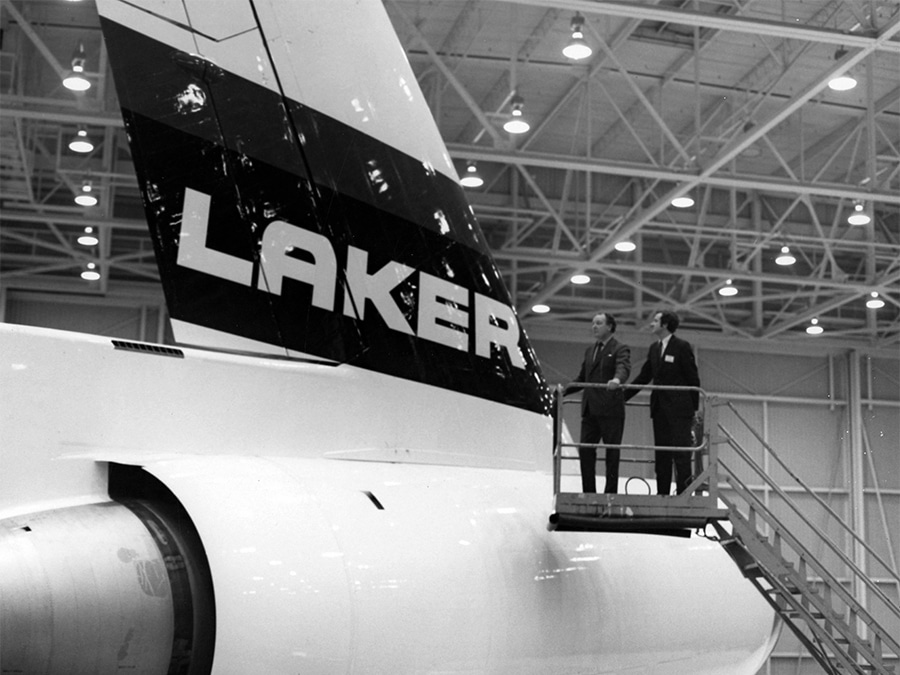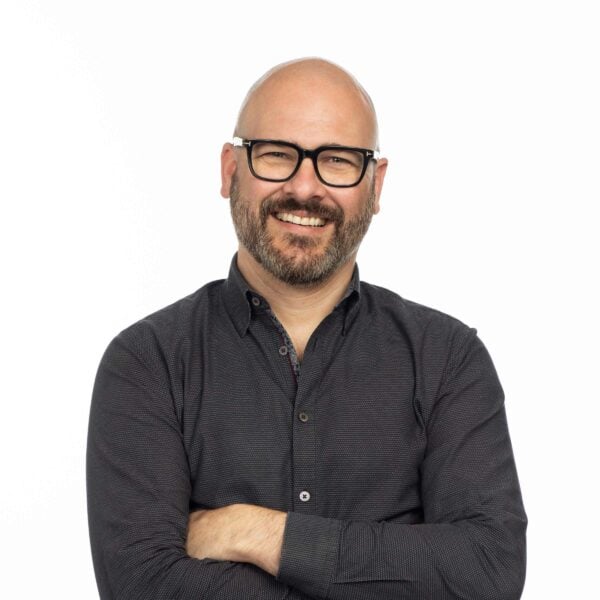This profile piece on Pando touched on some very personal subjects I hadn’t thought about in a long time. If you want some insights on my background I encourage you to read it. It was originally published on Pando.com on February 28th 2014 here.
Freddie Laker carries his father with him everywhere he goes.
He bears him on his back, cloaked in a thick brown bomber jacket from the 1970′s, a relic of Sir Freddie Laker Senior’s wardrobe. He hauls him in the form of a giant album with yellowing pages covered in logs of every flight he’s taken since infancy. He wears him in the shape of a tattoo, the Laker airlines logo branded on his right shoulder. “For such a jackass, I’m quite sentimental,” Laker admits.
Laker Jr. was raised in his father’s entrepreneurial shadow, growing up with riches as a result of his family’s dynasty. Laker Sr. founded British-based Laker Airways, the first low-cost transatlantic airline. It was an idea before its time, one that predated and provided the foundation for those that came after, like Southwest and Ryanair. It eventually went bankrupt, following the early 1980s recession. Nonetheless, it made Laker Sr. enormously wealthy and famous, and earned him a knighthood in the 1970s.
Laker Jr. might be best described as a son-trepreneur, a businessman who inherited his father’s taste for risk taking, particularly the sadomasochistic love of company creating. He’s not alone, we can look to Chris Ovitz and Ben Lerer for other examples. But Freddie Laker’s is a particularly poignant story.
Sitting in the Pando offices, Laker Jr. flips through a big, mahogany album. In it, page upon page are covered in tiny, precise handwriting, logging the date, flight number, commander, aircraft type, and destination for every journey Laker Jr. has ever taken by plane. He points to the very first entry. “My first flight was at age three months,” Laker says shaking his head. He’s taken 1,300 flights, and made 180 transatlantic crossings.
 From his birth, Laker Jr.’s father was preparing him to run an aviation company. At ten years old Sr. started teaching Jr. how to read financials, do operational planning, and understand every job at an airline.
From his birth, Laker Jr.’s father was preparing him to run an aviation company. At ten years old Sr. started teaching Jr. how to read financials, do operational planning, and understand every job at an airline.
As Laker Jr. grew older, the two started butting heads. Laker Jr. wanted to work with computers, having tooled around as a child with the Apple IIc Laker Sr. had in his office. “He didn’t know how to use it,” Laker Jr. remembers. “But Apple had him pose in the ad, ‘Big decision makers use Apple IIC.’”
Given that few universities were offering computer programming or hardware classes in the mid nineties, Laker Jr. saw no point in going to college. He dropped out of school after a few months, and was living the good life off his father’s dime, in Laker Sr.’s Miami home.
The tension between them inevitably came to a head, and Laker Sr. cut Laker Jr. off from his steep monthly allowance. “I was being a spoiled asshat, and he wanted to reality check me,” Laker says. The moment is permanently seared in Laker Jr.’s mind:
I was sitting in his office at Laker Airways. My dad came from nothing, a one bedroom house, his mother delivered coal and sold apples off her back kind of thing. He said, ‘I think you’re going down the wrong path. I tried to give you all the stuff I had but I didn’t do it right.’ He said, ‘I want you to experience life the right way.’ I’ll never forget, he said, ‘You’re going to hate me for it but you’ll thank me one day.’ I remember I did thank him a few years later. It was the best thing anyone has ever done for me.
Laker Jr.’s life changed dramatically after that moment. He moved into his girlfriend’s apartment in Pembroke Pines, then a rough part of Florida, and started trying to learn how to balance his own meager budget. More often than not he’d spend his entire month’s money in a few days time and wind up borrowing cash from friends. It was an uphill battle, but slowly and surely Laker Jr. learned to live life like the 99 percent.
If you think about what an entrepreneur is, one side is being dynamic and not being afraid of failure, a willingness to go for it. But the other side is — there’s this great quote, ‘There’s no such thing as a lack of resources, there’s just a lack of resourcefulness.” I had never been forced to be resourceful: All of a sudden I became scrappy.
Finally, Laker Sr. offered Laker Jr. a job, working for pennies, hand transcribing documents as a records clerk for the airline (“to teach me humility”). Laker Jr. worked his way up into a self-created, higher position as the Laker Airways network administrator and on hand IT guy, but still making next to no money.
Meanwhile, he started moonlighting at night as a DJ for The Womb, a popular pirate radio station in Miami.
What came next was a bit of a convoluted turn of events, the sort that would change the course of Laker Jr.’s life even if at the time its significance couldn’t be seen. The Federal Communications Commission tried to shut The Womb down for operating illegally.
Laker Jr. came up with the idea to push the station’s signal partly online, with software (built by Laker Jr.) that bounced the signal between two transmitters in different parts of town. The ploy confused the FCC for five months. “We were using the Internet to fuck these guys around,” Laker remembers.
Bear in mind, this was the mid nineties. Internet radio wasn’t a big thing yet and Pandora and Spotify were mere twinkles in their founders’ eyes.
When the FCC finally caught The Womb and shut it down, the story was big news, making the front of the Miami Herald among other outlets. Soon after Laker Jr. got a call from Rolling Stone magazine.
“They said, “You guys were one of the first 24-hour-a-day Internet radio stations and we want to interview you,” Laker remembers. He mimed covering a phone with his hand, “I literally turned to Duncan [his co-worker at The Womb] and said, ‘Hey did you know we were one of the first 24-hour-a-day radio stations?’”
Following the Rolling Stone interview, it didn’t take long for the phone to start ringing off the hook. People got wind that Laker “was the guy who could do Internet stuff” after the magazine’s feature. He was 19.
Laker did next what any ambitious person would. He used his new found business leads as a bargaining chip. He asked his dad for a raise.
“I said, ‘Can you please pay me $26,000? If I leave you’re going to have to hire a network guy and it will cost even more,’” Laker says.
His father refused (“He was still trying to tough love me”) and Laker quit to start his own Internet Service Provider company selling dial-up modems — aptly named Laker.net. As a cheeky maneuver, he rented an office space in the same building as the Laker Airways office in Miami.
It was the move that would permanently take Laker Jr. off the path of his manifest airline destiny and set him on his own entrepreneurial course.
He built out Laker.net, eventually even bringing on Laker Airways as one of 15,000 clients. After seven years he merged the company with a different one, a business deal that went over horribly wrong and destroyed Laker.net. “I was starting to become the person my dad had described himself as, where I’m the guy who’s fucked up things others haven’t even thought of yet,” Laker says ruefully. “I’m accumulating these experiences, and it’s OK.”
In true entrepreneurial form, he immediately started another venture, a digital advertising company called iChameleon, taking some of his former clients with him. This one went a little more smoothly, and the agency slowly started gathering acclaim for its viral marketing stunts. Eventually, Laker believes, Laker Sr. came to accept and feel proud of the alternative, non-aviation route his son had taken.
“When iChameleon got a 10,000 square foot office,” Laker says. “It was big — like his offices. He saw it packed full of people, and then he was like, ‘Alright. Rock on.’”
Laker Jr. eventually sold iChameleon to Sapient, at the time the largest independent digital agency in the world. He stayed on for another four years and rose through the ranks to become a VP.
He loved it, but eventually got restless. He came up with an idea for a video production startup, and his advertising agency invested in him. “To the best of my knowledge they’ve never done [that] for anyone else in the 23 years of Sapient’s history,” Laker says.
The company, called Guide, became Laker’s full-time work. His team built technology that could turn a print article into a video almost automatically, by semantically analyzing the key terms of the story and pulling images from stock photo agencies.
It’s the most startup-y venture Laker Jr. has undertaken so far, and he says he has big dreams for it.
Between the logbook and the constant stories of battling to gain his father’s approval, it’s clear what drives much of Laker’s determination to succeed.
“My whole life, I’d always be introduced to people as, ‘Oh you’re Freddie Laker’s son,’” Laker Jr. says, smiling. “My ambition was that at some point he would start introducing himself as Freddie Laker’s father. I don’t think he ever saw that day though.” (Laker Sr. passed away in 2006, at the age of 83.)
The sentiment mirrors what Ben Lerer told Sarah Lacy at PandoMonthly in August 2012. He started Thrillist to prove he was more than his last name. “The reason I think I’ve been successful has actually been…through insecurity,” says Lerer. “I don’t want to be some guy that people look at and say ‘eh, he works with his dad.’”
Likewise, Laker homes that Guide Laker could finally be the company which takes him out of his father’s shadow andintroduces the name Freddie Laker to an entirely new generation, as a byword for massive success as opposed to bold, but ultimately foiled, business ideas.
That burning ambition, that legacy and — yes — the fact that when you meet Freddie Laker Jr. you really, really root for him to succeed, made the email I received last week, as I was still working on my profile of Guide, all the more heartbreaking. Laker Jr. wrote:
Guide failed to find its funding. I’ve decided to pack it in. I made up my mind on Monday that I just can’t finance the company any more while I waited for investors to come through for me. It’s quite depressing to put it mildly. I think I’m in a state of shock that we couldn’t pull it off in time.
Absent a last ditch savior, Guide, Freddie Laker’s third startup, will likely close its doors in the next few days. It seems unlikely, however, that Laker Jr. himself will be brought down to earth for long.
I always think back to my the advice my father gave me when he said “I’ve fucked up things you haven’t even thought of yet…” I’m 36 now and still 35 years younger than [his age] when he said that to me. I’m sure I’ll have some more successes and I’m sure I’ll have some more failures whether that’s as an entrepreneur or in the corporate world. Either way I’ll continue to strive to have the courage to not sit on the sidelines when I see a challenge I want to take on.




